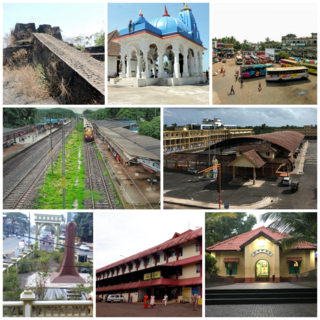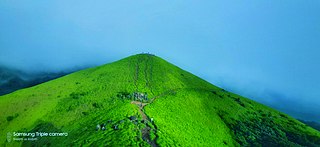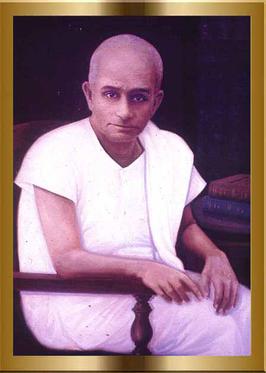
Kasaragod is a municipal town and administrative headquarters of Kasaragod district in the state of Kerala, India. Established in 1966, Kasaragod was the first municipal town in the district. It is the northernmost district of Kerala and is also known as Saptha Bhasha Sangama Bhoomi.

Kanhangad is a town, located in the Kasaragod District, state of Kerala, India.

Ayillyath Kuttiari Gopalan Nambiar, popularly known as A. K. Gopalan or AKG, was an Indian communist politician. He was one of 16 Communist Party of India members elected to the first Lok Sabha in 1952. Later he became one of the founding members of the Communist Party of India (Marxist).

P. Krishna Pillai was a communist revolutionary from Kerala, India. He was one of the founding leaders of the Communist Party of India in Kerala, and a poet.

Pulloottupadathu Bhaskaran alias as P. Bhaskaran, was an Indian Malayalam language poet, lyricist of Malayalam film songs, and filmmaker. He penned more than 3000 songs for about 250 films. He also directed 44 Malayalam feature films and three documentaries, produced six feature films, and acted in several movies. For his overall contributions to Malayalam cinema, he was awarded J. C. Daniel Award by the Government of Kerala.
Guruvayur Satyagraha took place in (1931–32) and was a Satyagraha in the present Thrissur district, which was then part of Ponnani Taluk of Malabar district, now part of Kerala, which was an effort to allow entry for untouchables into the Guruvayur Temple. It was led by K. Kelappan, who undertook a hunger strike for 12 days until it was abandoned because of a request from Mahatma Gandhi and the Indian National Congress. Mahatma Gandhi hailed it as "the miracle of modern times" and "a smriti which is peoples charter of spiritual emancipation". K. Kelappan, A.K Gopalan, P. Krishna Pillai, Mannathu Padmanabhan and N.P Damodaran Nair were the leaders of that agitation. It was a failure, For another four years, nothing much changed in Guruvayur or in the rest of the region that today constitutes the State of Kerala. It was only in 1936 that many temples in Kerala were opened for all to use.

Kasaragod is one of the 14 districts in the southern Indian state of Kerala. Its northern border Thalappady is located just 10 km south to Ullal, which is the southernmost portion of the major port city Mangalore, on the southwestern Malabar coast of India.

Vaikom Satyagraha, from 30 March 1924 to 23 November 1925, was a nonviolent agitation for access to the prohibited public environs of the Vaikom Temple in the Kingdom of Travancore. Kingdom of Travancore was known for its rigid and oppressive caste system. The campaign, led by Congress leaders T. K. Madhavan, K. Kelappan K. P. Kesava Menon, George Joseph, E. V. Ramasamy "Periyar" and was noted for the active support and participation offered by different communities and a variety of activists.

Mohammed Abdur Rahiman Sahib was an Indian freedom fighter, Muslim leader, scholar, and politician from Kerala. He served as president of Kerala Pradesh Congress Committee(Malabar) in 1939.

M. P. Parameswaran is an Indian nuclear engineer and educationist, who played an important role in the Indian nuclear programme. In 2022, he was honoured with Kerala Sree Award, third highest civilian award given by the Government of Kerala.
S. Ramesan Nair was an Indian lyricist and poet who worked predominantly in the Malayalam film industry. Over his career he wrote songs for over 170 films and over 3,000 devotional songs outside of the films. He debuted with the movie Pathamudhayam in 1985. He was a recipient of the Kerala Sahitya Akademi Award in 2010 and the Kendra Sahitya Akademi Award in 2018 for his collection of poems Gurupournami.
K. Madhavan was an Indian independence activist and Communist leader from Kerala, India.

Nalapat Narayana Menon was a Malayalam language author from Kerala state, South India. His oeuvre consists of poems, plays and translations. His best known works include Paavangal, a translation of Victor Hugo's Les Misérables, and the elegy Kannuneerthulli.
K.A.Keraleeyan (1910–1994) was one of the founder-leaders of the Communist Party of India in Kerala. He was born on April 15, 1910, in Chirakkal taluk in Kannur district.

Kannur, formerly known in English as Cannanore, Arabic as Kannanur, and Portuguese as Cananor, is a city and a Municipal Corporation in North Malabar region, state of Kerala, India. It is the largest city in North Malabar, which is the northernmost region of Kerala. It is sometimes identified Kolathunadu, which was ruled by the Kolathiris. In the 12th and 13th centuries there was trade with Persia and Arabia.

K. Kumar (1894–1973) was an Indian orator, reformer and writer of the Indian pre-independence era. He was one of the earliest socio-political leaders to have brought Gandhi's message and the spirit of the national movement to the erstwhile Travancore State. A gifted translator, he traveled with Gandhi during his Kerala tours, interpreting his English speeches in Malayalam. He was also an Advisor to the Nehru government. Kumarji was the President of the Travancore Congress Committee and was also in charge of Gandhiji's Travancore tour more than once. He served on the AICC and on the working committee of the AICC, TC-PCC/ KPCC heading its Constructive Work Committee during crucial years of the freedom movement. He also functioned as the Chairman of the Parliamentary Committee of Travancore
The reformation movement in Kerala refers to a socio-cultural shift that began in the late 19th century, resulting in significant transformations in the social fabric of the southern Indian state of Kerala.
A.V. Kunjambu (1908-1980) was an Indian politician who took part in the Karivellur agitation and played an important role in the formation of the Communist Party in Travancore. He worked for the welfare of the working class till the end of his life.
Kayyur incident also known as Kayyur uprising or Kayyur Revolt is a series of incidents that occurred in Kayyur village of present-day Kasaragod district during British rule in India. The peaceful farmers protest on 1941 March 28 turned violent and the mob accidentally killed a policeman. 61 were trialed for this violent deed and 4 persons were sentenced to death.











